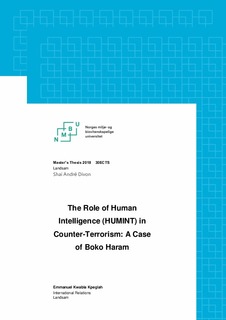| dc.description.abstract | The role of human intelligence (HUMINT) in fighting terrorism with specific focus on Boko Haram war with the Federal Nigeria is the core of this thesis. It delves into how HUMINT was deployed in the fight, the strengths and deficits of these strategies and lessons that emerge in their use. Boko Haram, the terrorist organisation that registered its lethality on the global scene of terrorist organisations attracted a good measure of scholarly attention. Much is done on their mode of attacks, their growth, their religious and social significance, what they stand for, what they could do and the tactical strategies the security adopts to contain, deter and defeat them. There is yet to be a keen attention on the use of human intelligence in fighting the war.
The study discovered the use of local assets or spies in the dearth of trained intelligence officers knowing how long it takes to train an efficient intelligence asset. In-depth interviews with past and present intelligence officers and the engagement of experts in security from academia brought a new dimension of locating local assets at the estimated setting of terrorist targets to access asymmetric information for policy could be a new way human intelligence could add on to existing strategies. This is because intelligence assets are mostly constrained by language and in the case of Boko Haram Kanore, culture, geography in very localised conditions. Situations of this nature could reduce an asset to a strategic liability, vulnerable to capture by the enemy and its concomitant compromise of tactical operations. | nb_NO |

